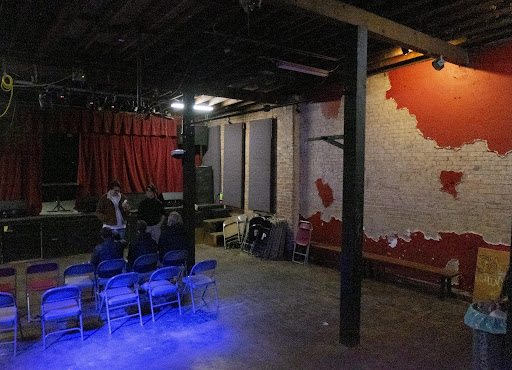The Beehive, a garage-like venue and dimly lit vegan bistro decorated with punk art, is fostering a sense of community among young people looking for live music in downtown Salt Lake. Known for attracting alternative bands, new musicians and young adults to the stage, the venue offers a welcoming stage for those seeking connection
“Young adults feel like they don’t have a place to be and for lots of them, that place can be concerts,” said Andrew Earley, owner of The Beehive, formerly The Deluxe on State Street.
Since Kilby Court, one of Salt Lake’s earliest and still-running alternative music venues, opened in 1999, several others have begun to follow in the years since, including The Beehive, The Underground, Tiny Porch concerts in the 9th & 9th neighborhood and Fountain Records. Often, these venues, geared to those under the age of 21, are constructed out of repurposed spare spaces and stocked with second-hand audio equipment and furniture.
Opening a space for young adults who aren’t of legal drinking age has been a motivation for several of these alternative venue owners, including Adam Michael Terry, who opened the Fountain Record music collective and store in November 2023.
Creating a space for the under-21 demographic, Terry said, was one of his main goals for the weekly live jazz nights in the store’s basement. Salt Lake City lacked the jazz scene, he said, especially for those who couldn’t go to bars, and he wanted to create an affordable and accessible scene for young adults.
“Music scenes often rely on venues,” Terry said.
Earley, who is also executive director of the nonprofit Alternative Arts and Music Program Utah, said he had a similar vision for The Beehive when it opened in 2016. The venue and non-profit organization also work together to provide an affordable and accessible platform for artists, according to its website.
Audience Connection
The size of DIY venues, often accommodating an audience of anywhere from 50 to 100, offers intimacy between the artists and the audience. More traditional venues, like the Delta Center, have around 20,000 seats, according to its website. Earley said he wants this intimacy to pull young adults together and inspire them to start playing music or to join a band.
He said he hopes “[the audience] can be empowered instead of awed.”
Earley said he also wants to move away from how traditional venues separate the musicians and the audience, with a large seating arrangement and a tall stage. Attendees can feel disconnected from the artists and artists can have a hard time interacting with the audience, he said. The environment of small DIY venues creates a better experience for both the artists and the audience, he added.
Young adults find a lot of value in the community surrounding local alternative music, said Aidan Hatch, who attended one of Fountain Records’ jazz nights for the first time in November. Knowing that the scene supports local business and creates a community space brings locals together, said Hatch.
“It’s very important because it’s a way to share experiences and because it’s unique,” he said.
Beckham White, a young concertgoer, said smaller venues that cater to younger audiences also foster an emotional connection to music and the artists.
“There’s always a want for places like this,” he said during a Nov. 7 jazz night at the store.
“New Endeavors”
Earley added that non-profit and DIY venues are also much more accessible to young and new musicians because they charge fewer fees and are more likely to host unknown artists. This gives bands opportunities to grow and experience a different level of live performance.
He said giving young musicians their first professional gig is valuable because it creates energy and community among newer artists, both individually and as a group.
“Our ability to give that opportunity to new bands in a healthy scene is the biggest contribution The Beehive has had to Salt Lake City’s music scene,” said Earley.
Terry said he also enjoys mentoring young musicians who volunteer at the jazz nights, helping them hone their improvisational skills and learn to share the musical space.
“The evolution [of the scene] is for the musicians, who are still developing,” said Terry. “It introduces you to like-minded people and hopefully new endeavors.”
Sebastian De La Cruz, a bassist who’s been playing at Fountain Records for a few months, said the opportunity to regularly play live with other artists is important for new musicians. He said he’s learned more not just about music but also about himself as an artist.
“Playing live with other musicians is the best practice you can get and a great way to get know music through the people you meet,” he said.
For some, the alternative live music scene is also a place to foster counterculture and to advocate for what they believe in, Earley said. The goal for some venue owners is for that space to be healthy and safe while still impactful, he added.
“Everywhere you have a dominant culture, there’s a significant pushback. People don’t have a place, and alternative music can resonate with these people,” said Earley. “It’s healthy counterculture.”
This article was published from the University of Utah’s COMM 1610 class.


